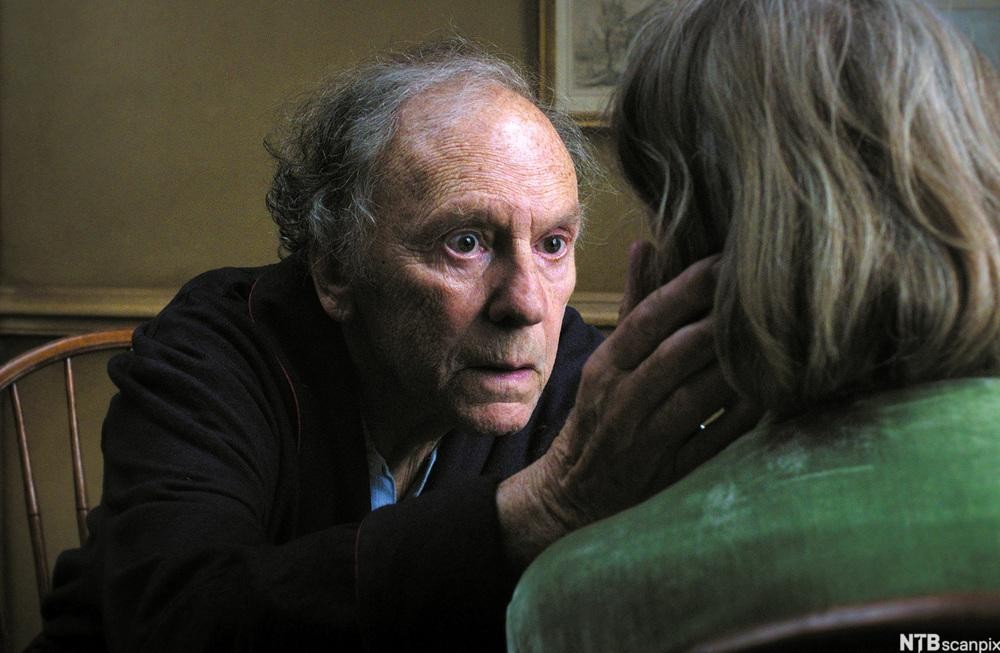

‘Amour’ by Michael Haneke
- Title ‘Amour’ by Michael Haneke
- Author Michael Haneke (director and writer)
- Year 2012
- Language French
- Tags Gender and Caregiving Inadequate Care Death Outside the Law
- Legislative context Loi no 2005-370 relative aux droits des malades et à la fin de vie, 2005 (Loi Leonetti) (France)
- Author of entry Jordan McCullough
When Anne suffers an absence seizure, marking the beginning of a steady neurodegenerative decline, her husband, Georges, becomes her carer. Over time, Anne becomes increasingly dependent on her husband and decides that she does not want to continue living. Although Georges initially dismisses her request, when she reaches the stage of no longer being able to communicate or complete even the most basic of tasks, he takes matters into his own hands and suffocates his wife with a pillow. Does this constitute an assisted death or is it simply murder? The viewer is left to make that decision as they follow the story from the opening scene, in which Anne’s body is found by the police, through the events that led up to her death and into the closing scene, where Anne has been killed, Georges seals the couple’s bedroom like a tomb and exits the flat, leaving it empty and untouched until the police break in.
Haneke’s film deliberately problematises the definition of an assisted death, muddying the waters between voluntary euthanasia (given that Anne has expressed her wish to die and is no longer able to fulfil that desire herself) and murder/manslaughter (in that Georges suffocates his wife in what appears to be a snap decision, without any obvious request from her at the moment of her death). The film also probes the extent to which social factors played a role in Anne’s desire for an assisted death and in Georges’s decision to help/kill her. We see the lack of professional homecare provision in France, the pressure placed on Georges, as his wife’s primary carer, and the lack of understanding shown by the couple’s daughter and her husband. In presenting these various contributing factors, Haneke asks his viewers to reflect deeply on the care and support offered to the global ageing population, on how it could – and should – be better, and on the limits of that care and support, in terms of what constitutes an ‘acceptable’ form of assistance in dying.
Suggested citation
-
Amour, Assisted Lab’s Living Archive of Assisted Dying, 18 March 2024 <link>
Reviews
- Gérard Lefort, Critique : L’amour dans l’âme, Libération, 2012 → liberation.fr
- Marie-Noëlle Tranchant, Haneke au chevet de la mort pour son film Amour, Le Figaro, 2012 → lefigaro.fr
- Manohla Dargis, At Cannes, Love Beset by Age and by Faith, The New York Times, 2012 → nytimes.com
- Peter Bradshaw, Cannes 2012: Amour – review, The Guardian, 2012 → theguardian.com
- Deborah Young, Amour: Cannes Review, The Hollywood Reporter, 2012 → hollywoodreporter.com
- Luis Martínez, Deslumbrante y lúicdo paseo de Haneke por el dolor y la muerte, El Mundo, 2012 → elmundo.es
- Salvador Llopart, El amor en la vejez, según Michael Haneke, La Vanguardia, 2012 → lavanguardia.com
Media citations
- A.J. Goldmann, Review: In ‘Amour’, Putting a Palme d’Or Winner Onstage, The New York Times, 2023 → nytimes.com
- Hannah Goldfield, Surviving ‘Amour’, The New Yorker, 2013 → newyorker.com
- Dennis Lim, Looking Directly at Life’s Decline, The New York Times, 2012 → nytimes.com
- Tom Shone, Michael Haneke Goes Cruelty-Free with Amour, Vulture, 2012 → vulture.com
- Sheri Linden, Michael Haneke investigates ages-old issues in Amour, Los Angeles Times, 2012 → latimes.com
- Alexandra Marshall, The Making of Amour: Michael Haneke’s Personal, Painful Drama About the End of Life, 2012 → hollywoodreporter.com